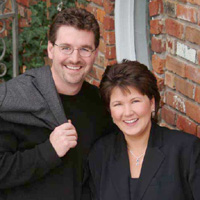
On the other hand, many couples don’t understand why people think and feel that way. “We don’t know why people say they could never work with their spouses. We wouldn’t want it any other way,” was the consensus among Joe and Michelle Kahn, Marc and Michelle Lefebvre, Gary and Jennifer Slater, Steve and Christine Schauble and Jeffrey and Julia Woods.
The Kahns
Joe and Michelle Kahn first met at a restaurant in Dubuque, Iowa, which Joe owned and where Michelle was a server. The couple eventually decided to sell their restaurants in the Dubuque area and move back to Michelle’s hometown of Peoria.
The Kahns opened Basta’s—which they define as “popular Italian cuisine”—in Peoria in 1998. Since then, the restaurant has moved several times before landing at its current location in Peoria Heights. Two-and-a-half years ago, the couple opened their second restaurant—Seven on Prospect, a contemporary fusion restaurant.
While they both do a bit of everything, Joe enjoys stepping into the kitchen or behind the bar, while Michelle likes to work with the wait staff and welcome guests as they come in. Their favorite part of operating a restaurant is the people; they love working with guests and staff alike. The Kahns say that, while the hours are unusual—and plentiful, they are not stuck behind a desk all day, which makes the long days not only tolerable, but enjoyable.
 The Schaubles
The Schaubles
Steve and Christine Schauble own Schauble Homes, a new home construction and real estate firm. Steve is president of the company and spends most of his time on the construction side of things. He recently became a licensed REALTOR®, enabling him to show houses when the need arises. Christine is vice president and the main Realtor of Schauble Homes Keller Williams.
When it comes to designing houses, the Schaubles work together. Steve is in charge of floor plans, while Christine concentrates on interior design, including paint colors and furnishings, when necessary. When it comes to real estate, Christine works closely with the Schauble Team—the office staff members who keep the company running smoothly. Steve and Christine have come to trust and rely on their team members to fulfill the mission of Schauble Homes: to have a profound impact on clients and the community while creating clients and relationships for life.
 The Lefebvres
The Lefebvres
Marc and Michelle Lefebvre own DLA Creative, a small, full-service marketing communications agency which takes care of clients all the way from strategic planning to tactical execution. They offer creative development, print production, the creation of a web presence and audio and video production, among other services. Marc Lefebvre and Pat Doyle began the business in 1993—Marc asked Michelle to come aboard when Pat decided to leave in 2000.
Over the years, the Lefebvres have honed their marketing services for medium-sized businesses, especially those in healthcare, finance and other service-oriented industries. As the company has grown, they have hired more employees and now have a team of five employees and two regular consultants. Because their staff is small and close-knit, the Lefebvres get to wear many different hats.
Marc’s main focus is on leadership of the team and the design side of the business, which is complemented by Michelle’s gifted writing skills and the overseeing of day-to-day details. The couple takes pride in the fact that all of its employees sincerely enjoy their jobs. Their small staff also allows them to establish closer relationships with clients than most agencies are able to do, creating mutual trust between DLA and its clients.
 The Slaters
The Slaters
In 1999, Gary and Jennifer Slater founded The Computer Doctor, a company which specializes in computer hardware and software solutions. They design, implement and maintain entire networks, focusing on small- and medium-sized business and home network solutions. The Computer Doctor uses the latest products and technologies available in their computer consulting services. The Slaters focus much of their efforts on customer service and credit their success to careful attention to customers’ needs and constant introspection of how they run their business.
Gary is the primary “doctor,” handling all technical aspects of the job while Jennifer handles design work for advertising and marketing, the finances and all other creative aspects of the business. As their business has grown, the Slaters have had to practice the art of project delegation. Their increased workload has forced them to delegate more and more duties to their technicians and their receptionist.
 The Woods
The Woods
The photography business which Jeffrey and Julia Woods created began as a hobby and grew into two companies—Portrait Life and Wedding Life photography. They are extremely committed to clients’ desires in terms of how many different photos they want as well as where in their homes they plan to hang them. Julia talks with each client well before their photo shoot to plan outfits and settings which will be exactly what each client is looking for.
The Woods now shoot every session together and say that when they shot separately, neither Jeff nor Julie was satisfied with how the photos turned out. The couple’s refreshingly unique art is what arises from the combination of Jeff’s focus on fashion and Julia’s focus on the relationship of the people in the shots and their relationship to each setting.
Jeff and Julia have made a successful business out of what they love to do. In fact, they have become so good at it that they are spokespeople for Adobe and Canon and speak at numerous conferences on the subjects of photography and working with your spouse.
Working with Your Spouse: The Consensus
These five couples offered similar answers to just about every question I asked them. When asked, “Does working together make you a better husband or a better wife?” a resounding “Yes!” was the answer. “Does working with someone who knows you so well, especially your strengths and weaknesses, make it harder or easier to work together?” Not one person said “harder.” When asked, “What are the challenges of working with your spouse,” the unanimous response was “separating work from personal time.” Although these couples weren’t aware of each other’s responses, they couldn’t have been more similar in terms of their feelings and approach to working together as spouses.
All five of the couples agreed—almost in the exact same words—that working together makes each partner a better husband or wife because both spouses know their business so well and are able to relate to what the other says at home about work. It’s easier to deal with bad days and moods because they know exactly where the other is coming from. Each person knows he/she can rely on his/her spouse to listen to or help the other vent. Michelle Kahn says that, after a rough day, “if Joe comes home and wants to talk about it, I can relate to what he’s saying; he has someone to talk to. But, at the same time, sometimes I know to leave him alone because I know what’s going on.” Knowing in detail the cause of a bad day can be very helpful in comforting or talking through things with one’s spouse.
Jeffrey and Julia Woods found that because they work together, they are forced to talk to each other more than the average married couple, which they feel strengthens their marriage. Julia also noted that working with one’s spouse increases the respect a person has for his/her significant other: “I definitely think it’s made me a better wife because in the day-to-day life of having time together at home, it’s easy to focus on your spouse’s lackings. But, when you work with that person and see how much your clients love and respect them, you are proud of what they’ve accomplished, and it really helps you to see a lot more of the positives.”
Each couple agreed that working with someone who knows their strengths and weaknesses makes it easier to work together. Christine and Steve Schauble attributed this to knowing how the other person thinks. The Kahns feel that they can better anticipate each other’s reactions and know the best way to give the other bad news when necessary than business partners who are not married. Jennifer and Gary Slater said being married helps them know each other’s limits when it comes to working. “For example, Gary is a clean freak and his neurosis drives me insane! But on the other hand, he knows I am not going to clean everything, so he just does it. And I know that he won’t make important phone calls, especially if we have to sit on hold, so I just do it,” Jennifer said.
Marc Lefebvre notes that when working with your spouse, “you know how each other thinks, and it’s actually easy to come up with something the client likes much faster.” Michelle added, “Since we’ve known each other for so long it’s much easier to accept creative differences because we know it’s about producing a quality project and not about the relationship.” She noted that this is not the case when working in larger firms where people spend time on internal politics.
This isn’t to say that there are no challenges to working with your spouse—there are many, the biggest of which is separating work and family life. Each couple has had to maintain a delicate balance between these two huge aspects of life. They all said that it’s easy to let work take over and not devote enough time and attention to their marital relationships. “Knowing when to stop working is about the only challenge,” according to the Schaubles. “There has to be a good balance.”
The Woods expressed that because they know each other so well and work so closely together, it’s easy to stifle change and growth in their careers. “Sometimes you know each other so well that you anticipate—you kind of stop giving each other room to change because you just assume, ‘well, he always does that when this happens, so I’m only to assume that’s going to happen again,’” Julia said. Making sure this doesn’t happen requires a conscious effort. IBI

